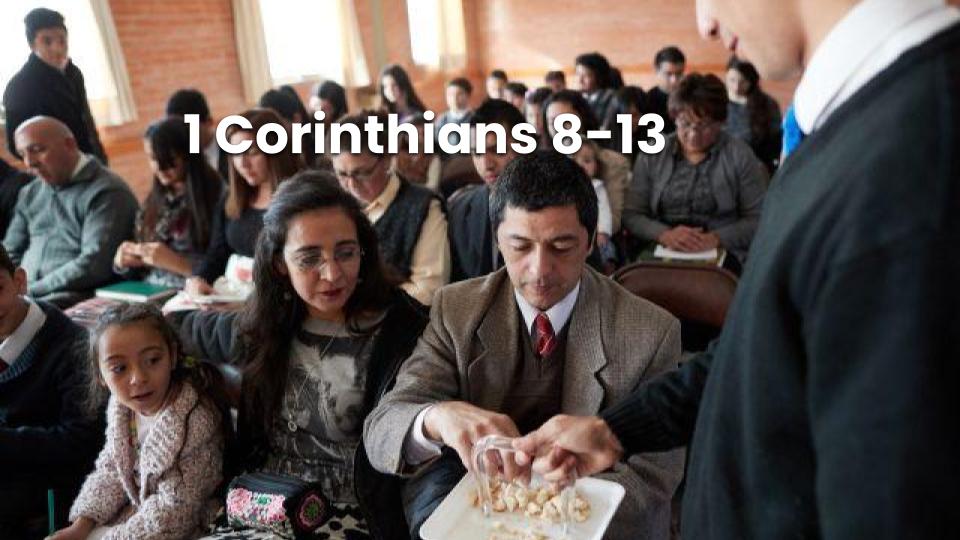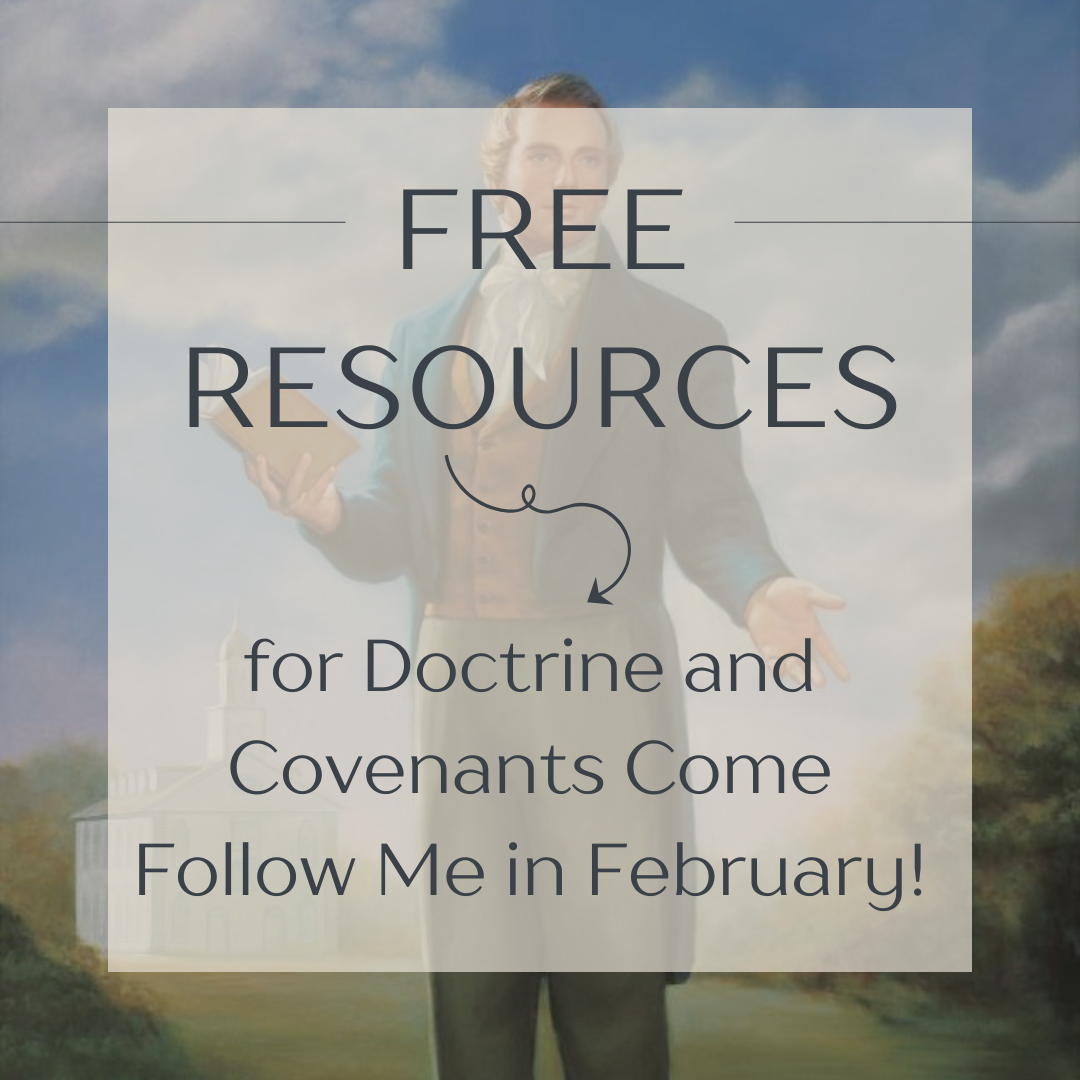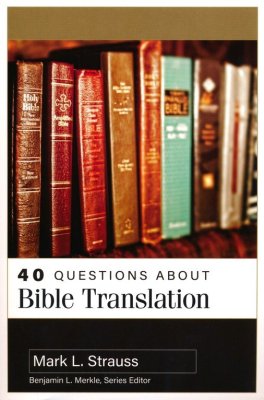Here are some ideas for learning and teaching a few of the great principles in 1 Corinthians 8-13. And while you’re here, I recommend you check out my free online course, “Seeking Jesus.”
Videos for 1 Corinthians
“The Sacrament and Christ’s Crucifixion” Highly recommended! This insight from 1 Corinthians 11 changed the way I take the sacrament. This is a 2-minute devotional excerpted from “Seeking Jesus.”
The Bible Project videos do a great job of helping us understand the big picture of 1 Corinthians. Watch here.
Ideas for Learning More About 1 Corinthians 8-13
***Eating Meat Offered to Idols: A Surprisingly Relevant Principle***
When you read 1 Corinthians 8, about eating meat offered to idols, it might seem completely irrelevant to our lives today. But I LOVE what Paul teaches here.
Paul was asked whether it was okay to eat meat that had been offered to idols. In some ancient contexts, people would sacrifice an animal to an idol, and then later sell or eat the meat that had come from the animal that had been sacrificed to an idol. When asked if this practice was acceptable, Paul responded, “Meat commendeth us not to God: for neither, if we eat, are we the better; neither, if we eat not, are we the worse” (1 Corinthians 8:8). In other words, the answer was, “It doesn’t really matter if you eat meat that has been offered to idols.”
“But,” Paul continued, “take heed lest by any means this liberty of yours become a stumblingblock to them that are weak. For if any man see thee which hast knowledge sit at meat in the idol’s temple, shall not the conscience of him which is weak be emboldened to eat those things which are offered to idols; And through thy knowledge shall the weak brother perish, for whom Christ died?” (1 Corinthians 8:9–11).
Paul taught that even though it didn’t matter whether people eat meat that had been offered to idols, they need to be careful. A person who is susceptible to idol worship might see a person with knowledge eating meat offered to idols. and take it one step further, saying, “It’s okay for me to worship idols.” Therefore, Paul told the Corinthians, “If meat make my brother to offend, I will eat no flesh while the world standeth, lest I make my brother to offend” (1 Corinthians 8:13). For Paul, if eating meat would have a negative effect on others, he would never eat meat. Not because he couldn’t but because he wanted to protect others. We are our brothers’ keepers. Not eating meat offered to idols was a fence law to discourage idol worship, but Paul felt that it was an important one because it would spiritually protect others, although not necessarily himself.
In our day, we might imagine two LDS colleagues Maria and Jasmine traveling together on a business trip. One evening, a group of employees plans a “poker night,” – no money involved, just for fun. Maria is strong in her convictions and knows that she could play a few hands of poker without turning into a compulsive gambler. In fact, she thinks it might be helpful for her career to spend some time bonding with her colleagues. However, Jasmine struggled with a gambling addiction in her younger years, but has since avoided it. Paul might say in this situation, “Maria, be careful. While you could potentially join the poker party and be fine, it’s possible that Jasmine will see you, and think ‘If Maria is going, I can go.’ This liberty of yours (playing no-stakes poker) could become a stumblingblock for Jasmine, and therefore you should think twice about going.”
What are some instances in which think we should restrain our “liberty” so as not to be a “stumblingblock” for others.
1 Corinthians 8 and 10, and questions about eating meat also relate to Paul’s teachings about judging in Romans 14. Here’s a video I made that has additional application ideas for teaching this principle.
***“Shewing” the Lord’s Death***
Our main sources for the Last Supper are Matthew, Mark, Luke, and John, but the earliest record we have of the Last Supper is actually Paul writing in 1st Corinthians. 1st Corinthians was written in roughly 53 AD, probably a decade or so before the Gospel accounts were written. It’s interesting to see in this earliest record of the Last Supper what Paul emphasizes.
He says, “I have received of the Lord that which also I delivered unto you, That the Lord Jesus the same night in which he was betrayed took bread: And when he had given thanks, he brake it, and said, Take, eat: this is my body, which is broken for you: this do in remembrance of me. After the same manner also he took the cup, when he had supped, saying, This cup is the new testament in my blood: this do ye, as oft as ye drink it, in remembrance of me” (1 Corinthians 11:23–25).
One lesson Paul wants to highlight from the Last Supper is Christ instituting the sacrament, specifically “In remembrance” of him. Recently you and I had the chance to partake of the sacrament. Did we remember Jesus? Sometimes things can become so commonplace that we miss the meaning. Have you ever said a word over and over again until it loses its meaning? The same thing can happen with the sacrament or other religious rituals, where they become so routine, we don’t remember to relate them to our Redeemer. Paul and Jesus want us to remember the Savior as we partake of the sacrament.
As Paul concludes this section, he makes a statement that has helped me focus on Jesus during the sacrament. He says, “For as often as ye eat this bread, and drink this cup, ye do shew the Lord’s death till he come” (1 Corinthians 11:26).
Most of us don’t use the word shew: S-H-E-W. What does this word even mean? If we were to go back to our friend, the Blue Letter Bible, we would see that the Greek words translated as “shew” mean to “proclaim publicly” or to “announce” or to “testify of.” If we take one of these other meanings, Paul is saying, “As often as you partake of the sacrament, you are publicly testifying of the Lord’s death.” That’s powerful. It might not be a fast and testimony meeting, but you and I are bearing our testimonies any time we partake of the sacrament. For me that’s changed the way I partake of the sacrament. As I take the bread and water I think, “Right now, I am publicly testifying of the death of Jesus Chris and what that means to me in my life.”
Here’s a video version of the above-text, and if you want to dive deep into Christ’s Crucifixion, including videos, podcasts, books, and more, see my page focused on Christ’s Crucifixion.
***What Charity Is***
Several years ago, I decided to memorize 1 Corinthians 13–but instead of using the King James Version I used phrases from different translations that really touched my heart. I’m including the text I memorized below, in case you’re interested. To memorize the whole thing is probably too ambitious (I have forgotten some of it!), but it might be a good family or class activity to memorize one or two verses from it. You might also be interested in how Elder Lynn G. Robbins uses these verses in a powerful way. It is a masterpiece!
If I could speak all the languages of earth and of angels, but didn’t love others, I would only be a noisy gong or a clanging cymbal. If I had the gift of prophecy, and if I understood all of God’s secret plans and possessed all knowledge, and if I had such faith that I could move mountains, but didn’t love others, I would be nothing. If I gave everything I have to the poor and even sacrificed my body, I could boast about it; but if I didn’t love others, I would have gained nothing.
Love is patient and kind. Love is not jealous or boastful or proud or rude. It does not demand its own way. It is not irritable, and it keeps no record of being wronged. Love does not think evil about others. It does not rejoice in wrongdoing, but rejoices in the truth.
Love never gives up, never loses faith, is always hopeful, and endures through every circumstance.
Prophecy and speaking in unknown languages and special knowledge will become useless. But love will last forever!
Now our knowledge is partial and incomplete, and even the gift of prophecy reveals only part of the whole picture! But when the time of perfection comes, these partial things will become useless.
When I was a child, I spoke and thought and reasoned as a child. But when I grew up, I put away childish things. For now we see only a blurred image in a mirror; then we shall see face to face. All that I know now is partial and incomplete, but then I will know everything completely, just as God now knows me completely.
Three things will last forever: faith, hope, and love; and the greatest of these is love.
***Additional Resources***
Paul makes some statements about women that are somewhat confusing. Sherrie Mills Johnson’s article, Paul’s Teachings in 1 Corinthians on Women can help us make sense of them.
It’s important to remember that Corinth was a Greco-Roman city. Learning about elements of its culture and greatly assist us in understanding Paul’s epistle to the Corinthians. Eric D. Huntsman’s article, “”The Wisdom of Men”: Greek Philosophy, Corinthian Behavior, and the Teachings of Paul” is helpful in this regard.
***
I hope these resources are helpful to you in your learning and teaching this week!
Do you want more learning and teaching tips for Come Follow Me? Follow me on Instagram or sign up here for emails with insights on Come Follow Me.






